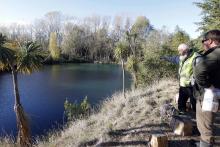North Canterbury Fish And Game Announce Lower Rakaia Fishery Restoration Project
- 20/06/2016
Thousands of Brown Trout will be released in the lower reaches of the Rakaia River shortly after the North Canterbury Fish and Game Council voted to approve the release of Trout in an attempt to restore the critically damaged fishery.
 Fish & Game staff researched possibilities of creating a specific enhancement program targeting the lower reaches of the Rakaia recently, the area has historically been regarded as a prolific brown trout fishery.
Fish & Game staff researched possibilities of creating a specific enhancement program targeting the lower reaches of the Rakaia recently, the area has historically been regarded as a prolific brown trout fishery.
The gradual demise of resident lowland brown trout and sea run brown trout populations is thought to be as a result of environmental degradation of habitat, and the dewatering of lowland streams as a result of, over intensified farming practices.
Combined with low annual rainfalls over the past 2 years, and with little natural ability to flush lowland streams, many brown trout populations are now stressed by critically low stream levels with escalating pollution issues.
Increased pressure to provide healthy and sustainable fisheries is now dependant on a few streams that are perceived as suitable, in comparison to the once abundant historic habitats.
The recent winter fisheries closures throughout the North Canterbury region, was implemented as a measure to protect trout and salmon breeding stocks.
As a proactive aspect to this decision, North Canterbury Fish and Game are implementing a lowland and sea run brown trout enhancement program.
North Canterbury Fish and Game Chairman Trevor Isitt says ”buoyed by the support from local Rakaia residents, Fish & Game have leapt at the chance to rebuild the fishery”.
Staff investigated prospective sites in the lower reaches of the Rakaia and identified two spring creeks that offered the potential of a fishery restoration program.
“These sites may also be key indicators of potential for further enhancement programs in other catchments in our region” Isitt said.
Bully Creek on the south side of the Rakaia, and Cold Stream/Boat Creek on the north are both thought to offer positive prospects for the initial program.
Fish and Game will release around 2,500 approximately 400 gm brown trout in the coming weeks.
The intention of the releases will be to encourage the trout to inhabit the release sites for a few months before they venture downstream to the tidal areas.
The reason for this is imprinting; the chemical signature of the respective spring creeks will feature in the otolith and it is hoped that they may return to the sites as adults to spawn.
Other considerations regarding the release sites researched are water quality suitability.
The information gathered will be of important value in setting the benchmarks for sustainable water qualities for all freshwater fish species and birdlife as well as recreational river users.
Fish & Game will implement an extensive monitoring program of the releases not only to measure survivability, but also to learn more about the habits of lowland sea run brown trout populations in our East coast fisheries.
The stocks proposed for the initial releases would be of plateable size by anglers within the first few months of release.
Anglers who catch marked fish would be encouraged to photograph, record tag details, and release them, at least during the first year of the program.
The ultimate result of the research program will be that Brown Trout numbers will be increased in our coastal Rakaia area lowland fisheries, and that the initial program will become a tool for other enhancement programs of degraded fisheries throughout the North Canterbury region.